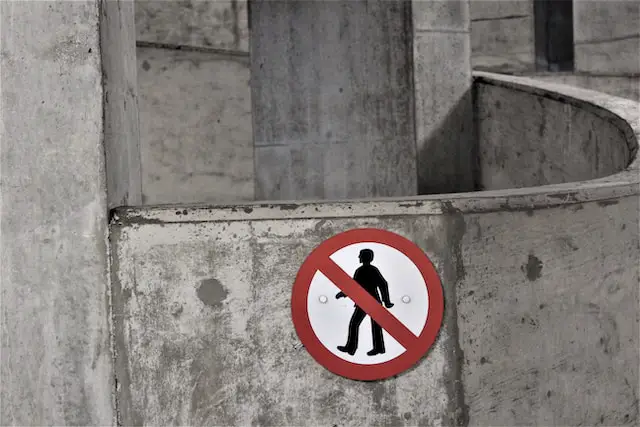Prohibited refers to something that is not allowed by law, while forbidden refers to something that is not allowed by anyone.
Definition of prohibited
(Photo by Siora Photography on Unsplash )

Prohibited is an adjective that describes something that is forbidden or not allowed by law, rules, regulations, or social norms. When something is prohibited, it means that there are specific restrictions or conditions that prevent it from being done, used, or accessed. Prohibitions are typically put in place to promote safety, security, fairness, and morality, and to prevent harm or negative consequences.
Prohibited actions or behaviors can vary widely depending on the context. For example, some activities may be prohibited by law, such as driving under the influence of alcohol, possession of illegal drugs, or theft. In other cases, certain behaviors may be prohibited by organizations or institutions, such as workplace policies that prohibit sexual harassment, discrimination, or bullying.
Prohibitions may also apply to certain items or products. For instance, some countries may prohibit the import or export of certain goods or substances, such as firearms, endangered animal species, or hazardous chemicals. Some products may also be prohibited from being sold or distributed to certain groups, such as cigarettes and alcohol to minors.
In some cases, the reason for prohibiting something may be based on moral or ethical concerns. For example, some religious beliefs prohibit certain behaviors or activities, such as gambling, premarital sex, or consumption of certain foods.
Prohibited refers to something that is not allowed, and there are usually specific reasons why it is prohibited. It is important to respect and follow these restrictions to ensure safety, fairness, and compliance with laws and regulations.
Definition of forbidden
(Photo By Pierre (Rennes) on Flickr)

Forbidden is an adjective that describes something that is strictly prohibited or banned by law, religious doctrine, social custom, or other authority. It suggests that the action or behavior is considered highly improper, immoral, or taboo, and that there may be serious consequences for violating the prohibition.
Forbidden actions or behaviors are usually considered to be more serious than those that are merely prohibited or restricted. For example, while smoking may be prohibited in certain public areas, it is not generally considered forbidden. On the other hand, activities such as murder, theft, or incest are typically considered forbidden in most societies.
The concept of forbidden can also apply to relationships, actions, or beliefs that are considered socially unacceptable or morally wrong. For example, in some cultures, romantic relationships between people of different races or social classes may be considered forbidden. Similarly, certain types of religious practices or beliefs may be considered forbidden by other religious groups.
In many cases, the reason for something being forbidden is based on deeply held cultural or religious values. For example, in some societies, certain foods or behaviors may be considered forbidden because they are believed to be spiritually impure or disrespectful to ancestors. In other cases, something may be forbidden because it poses a danger to public safety or health, such as the use of illegal drugs or possession of firearms.
Forbidden describes something that is strictly prohibited and considered highly taboo or immoral. It is important to respect and adhere to these restrictions to maintain social order, morality, and safety, and to avoid potentially serious consequences for violating them.
Prohibited Vs. Forbidden – Key differences
Prohibited and forbidden are similar concepts in that they both describe actions or behaviors that are not allowed. However, there are some key differences between the two terms:
Severity: Forbidden is generally considered to be a more serious term than prohibited. Something that is forbidden is seen as completely off-limits and may be considered taboo or immoral. Prohibited actions, on the other hand, may simply be restricted or regulated to a certain extent.
Authority: Forbidden actions are often prohibited by higher authorities, such as religious doctrine, social custom, or moral codes. Prohibited actions may be regulated by laws, rules, or regulations, but these are often imposed by government or other organizations rather than moral or cultural authorities.
Consequences: The consequences for violating forbidden actions are often seen as more severe than those for prohibited actions. Violating a forbidden action may result in social ostracism, religious condemnation, or even legal prosecution, while violating a prohibited action may result in fines, administrative penalties, or other legal consequences.
Cultural context: Forbidden actions are often specific to a certain cultural or religious context, while prohibited actions are more universal. For example, certain foods may be considered forbidden in some cultures, while firearms may be prohibited in many countries around the world.
The key differences between prohibited and forbidden are the severity, authority, consequences, and cultural context of the actions or behaviors in question. While the terms are similar, they may carry different connotations and implications depending on the situation.
Examples of prohibited and forbidden activities
Examples of prohibited activities may include:
- Driving under the influence of alcohol or drugs
- Using mobile phones while driving
- Smoking in public areas
- Dumping hazardous waste in improper places
- Selling or distributing drugs without authorization
- Plagiarism in academic or professional settings
- Falsifying information on official documents
- Entering a country illegally
- Harassing or discriminating against others based on their race, gender, religion, or other characteristics.
Examples of forbidden activities may include:
- Murder or intentional harm to others
- Theft or embezzlement of money or property
- Blasphemy or disrespect to religious beliefs or icons
- Adultery or extramarital relationships in certain cultures or religions
- Cannibalism or other forms of extreme violence
- Consumption of certain foods or substances considered spiritually impure or taboo in certain cultures or religions
- Violation of strict dress codes or gender roles in certain societies
- Acts of treason or betrayal to one’s country or community.
Prohibited and forbidden activities are generally seen as highly inappropriate or harmful in their respective contexts. It is important to follow laws, regulations, and cultural norms to ensure safety, respect, and social order.
What is the difference between illegal and forbidden?
The main difference between illegal and forbidden is that illegal actions are those that are against the law, while forbidden actions are those that are prohibited or banned by moral, religious, or social norms or customs.
Illegal actions are those that violate laws or regulations that have been established by governments or other legal authorities. Examples of illegal actions include theft, murder, fraud, and drug trafficking. These actions are punishable by law, and individuals who engage in them may face fines, imprisonment, or other legal consequences.
Forbidden actions, on the other hand, are those that are prohibited by cultural, religious, or moral standards, rather than by laws or regulations. For example, certain types of relationships or behaviors may be forbidden in some cultures or religions, even if they are not illegal. Violating these norms may result in social condemnation, ostracism, or other non-legal consequences.
Illegal actions are those that are against the law, while forbidden actions are those that are prohibited by moral, religious, or social norms. While there may be some overlap between the two, the consequences and enforcement of each may differ based on the specific context in which they occur.
Featured Image by – Possessed Photography on Unsplash









